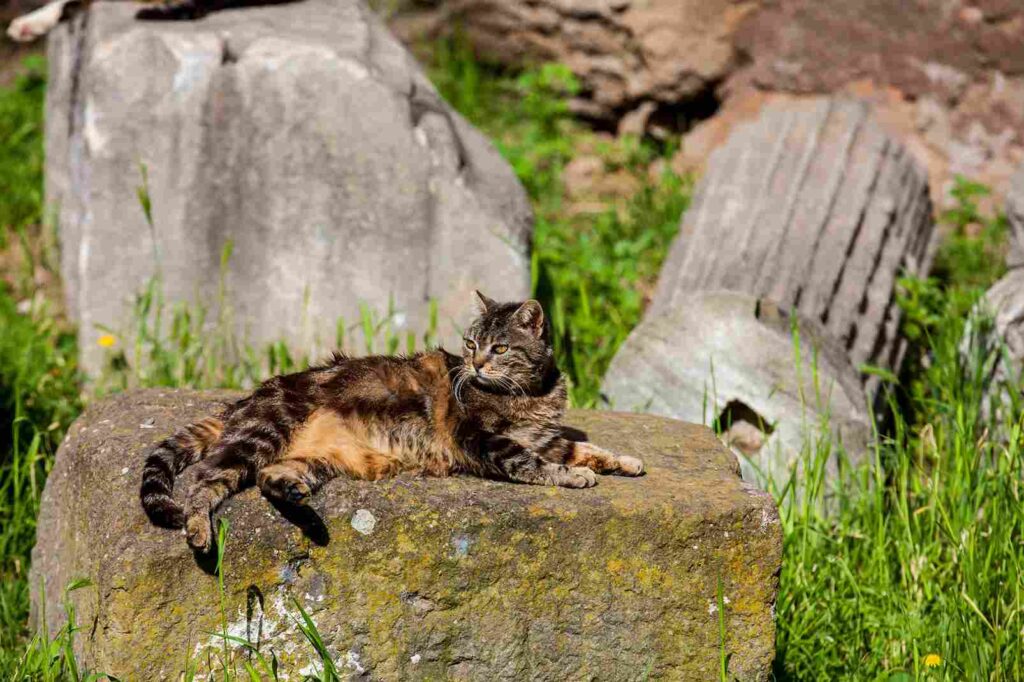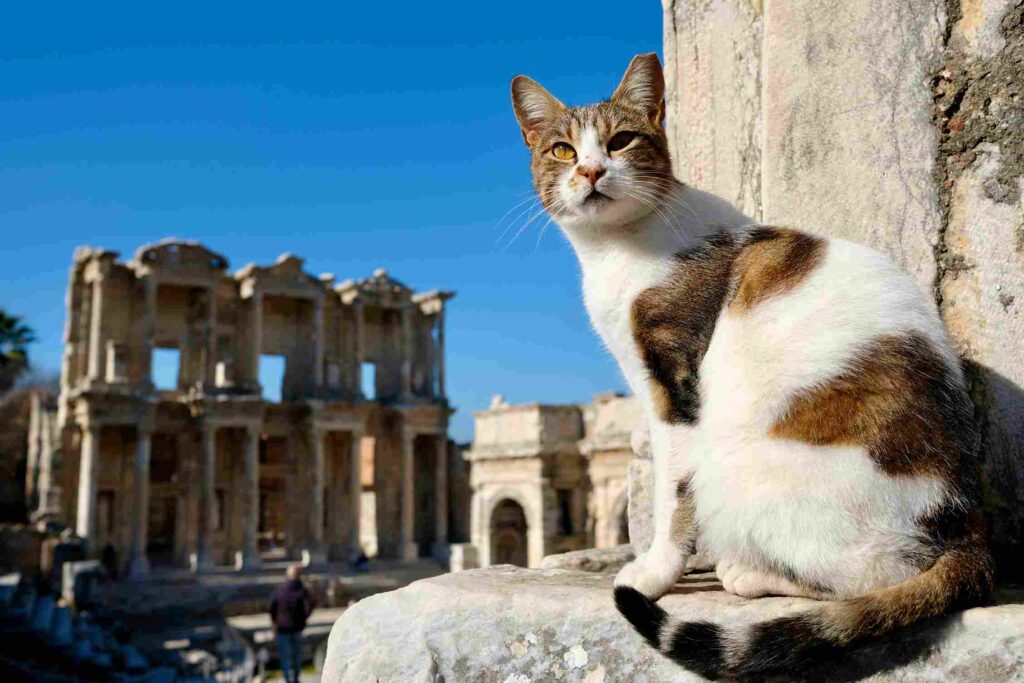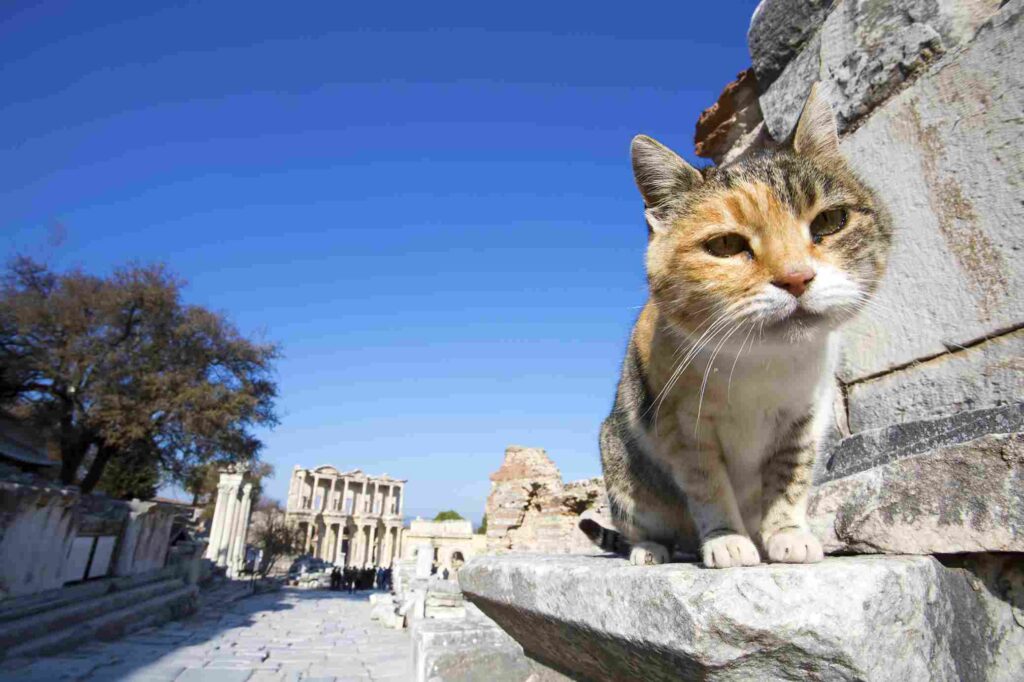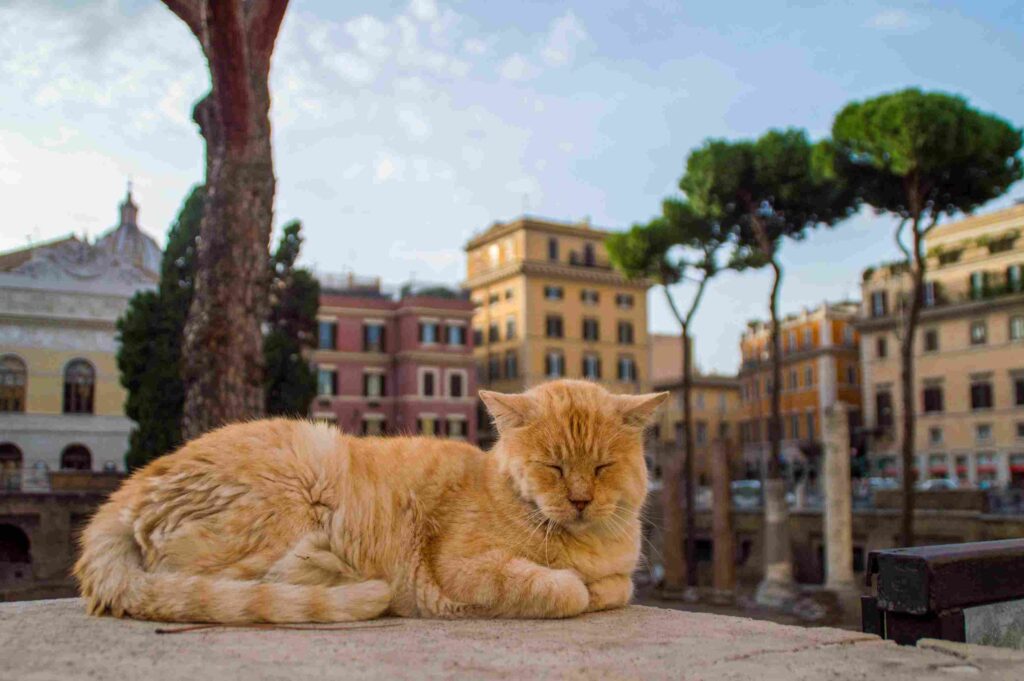Have you ever strolled through the charming streets of Rome and found yourself surrounded by graceful feline companions?
Well, Italians certainly have a soft spot for these whiskered creatures! This is reflected in a delightful array of cat-inspired expressions that enrich and color the Italian language.
To celebrate their reputation of nine lives, we selected nine Italian expressions with a feline flair!
Let's dive into the world of Italian idioms about cats… and “miao” (meow)!

Essere quattro gatti
This expression literally means “to be four cats“. It is used to describe a situation where there are very few people present, especially in contexts where the low attendance is unexpected and disappointing.
For example:
– Ieri sera siamo andati al concerto, ma eravamo quattro gatti! (Last night we went to the concert, but we were so few people there!)
Gatta ci cova
This expression literally means “a cat is hatching eggs“. Of course it's a figurative expressions… Italians do know that cats don't hatch eggs! In fact, this expression is used to insinuate that there is something suspicious or secretive going on, often implying that there may be hidden motives or deceitful actions involved… after all, if a cat is hatching eggs, there is definitely something suspicious going on!
For example:
– Laura arrossisce ogni volta che riceve un messaggio… secondo me, gatta ci cova! (Laura blushes every time she receives a message…in my opinion, something suspicious is going on!)
Una bella gatta da pelare
This expression literally means “a beautiful cat to peel“… but there is nothing actually beautiful about this! In fact, it is used to indicate a though task, something challenging and tricky to deal with. It implies that the situation or task is complex and requires a lot of effort to resolve.
For example:
– Oh no! Abbiamo inviato i documenti alla persona sbagliata… questa è una bella gatta da pelare! (Oh no, we sent the documents to the wrong person… this is a mess to fix!)
Essere come cane e gatto
This expression means “to be like cat and dog“. It is used to describe a relationship where two people constantly argue or fight with each other, similar to the stereotypical behavior of cats and dogs not getting along.
For example:
– Marco e Giorgio sono come cane e gatto… litigano sempre! (Marco and Giorgio are like cat and dog… they always quarrel!)
Non dire gatto, se non ce l'hai nel sacco
This expression means “don't say ‘cat' if you don't have it in the bag“. Pretty much like the English expression “Don't count your chickens before they are hatched”, it is used to advise against boasting or making promises about something that is not certain or guaranteed: it implies that one should not speak confidently about achieving something until it is actually accomplished!
For example:
– Mancano cinque minuti alla fine della partita e siamo in vantaggio… abbiamo vinto! (Five minutes to the end of the game and we are ahead-we won!)
– Noooo! Non dire ‘gatto' se non ce l'hai nel sacco! (Noooo! Don't count your chickens before they are hatched!)
Quando il gatto non c'è i topi ballano
This expression is pretty much equivalent to the English phrase “when the cat's away, the mice will play“… but in Italian, the mice are dancing instead of playing! It means that in the absence of authority figures or supervision, people may misbehave or take advantage of the situation.
For example:
– Non possiamo lasciare i ragazzi a casa da soli… quando il gatto non c'è, i topi ballano! (We can't leave the guys home alone… when the cat's away, the mice will play!)
Tanto va la gatta al lardo che ci lascia lo zampino
This expression means “the cat gets so close to the lard that eventually she loses her paw!”. It is said that this saying originated in a rural context, when stray cats used to sneak into farmhouses to steal the lard being cut. If the cat wasn't sneaky enough, it risked being chased with a huge knife! This expression is used when someone repeatedly takes risks or behaves in a reckless way until they eventually get caught and face consequences. This expression is somewhat similar to the English phrase “curiosity kills the cat”, however, in Italian, the emphasis is more on the reckless behaviour rather than on genuine curiosity!
For example:
– Giorgia continua a rubare le ciliegie dall'albero dei vicini… ma tanto va la gatta al lardo che ci lascia lo zampino! (Giorgia keeps stealing cherries from the neighbor's tree… she will eventually get caught!)
La gatta frettolosa fa i gattini ciechi
This expression means “the hasty cat makes blind kittens“. It is used to advise against rushing and acting too quickly, to avoid potential oversights or mistakes.
For example:
– Non fare i compiti all'ultimo minuto… la gatta frettolosa fa i gattini ciechi! (Don't do your homework at the last minute–the hasty cat makes blind kittens!)
Non c'è trippa per gatti
This expression literally means “there is no tripe for the cats“. It is used in situations where someone is unlikely to “get fed“, figuratively, to achieve their goals. It is used when someone is pursuing something that is very unlikely to be granted, much like a cat begging for food when there isn't any.
For example:
– È inutile chiedere un aumento… qui non c'è trippa per gatti! (It is pointless to ask for a raise… there is no tripe for the cats here!)
So… what of these expressions is your favorite? And your cat's favorite?


Did you enjoy this exercise? Want to perfect your language skills? ❤️
Join our community of learners today!
https://www.italymadeeasy.com/join

